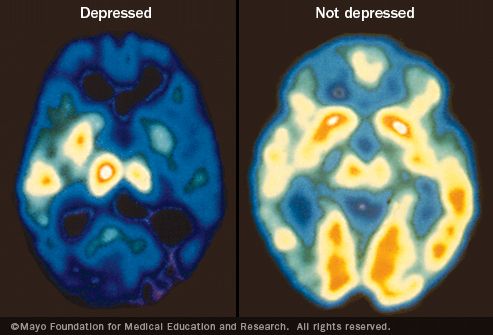In unipolar depression, the physical problem is believed to be an imbalance of either serotonin, noradrenaline or dopamine in the brain; or two or all three of those. Exactly how we don't know, and the exact imbalance is probably different for everybody, but generally speaking, most people with depression have less serotonin, or noradrenaline in their brain than healthy people do. The pathophysiology of Bipolar Disorder is poorly understood, but it is probably linked to the same three neurotransmitters as well as some structural abnormalities in the amygdala, basal ganglia and prefrontal cortex.1
PET (Positron Emission Topography) and SPECT (Single Proton Emission Computed Topography) scans are two types of brain scans which show how active or inactive the different areas of the brain are. PET scans of depressed brains compared to normal ones show a significant reduction in overall brain activity. This is why everything seems ten times harder when you're depressed and why it's much harder to concentrate and remember things. People with depression are like cars running on half a tank of gas, or in some cases hardly any gas at all. You can barely get out of the driveway, let alone make it around the block. In other words, if you're depressed, you can't expect yourself to carry on with your normal life while you are ill. So give yourself a break!
In people with Bipolar Disorder, PET and SPECT imaging usually shows decreased activity in the prefrontal cortex, which is involved in emotion and planning, the amygdala, which is associated with mood regulation, and the hippocampus2. This may explain the intense highs and lows bipolar sufferers experience. Patients in the depressed phased of a cycle show very similar scan results to patients with unipolar depression. In the manic phase, imaging shows both left-right and dorso-ventral asymmetry in the basal temporal cortex. I have absolutely no idea what that means.
But whether you have any idea of what a basal temporal cortex is or not, the important thing to understand is that...
[in serious mental illness] Your brain is physically injured, and like any other part of the body that has received a physical injury, it needs the proper care to heal... The problem that far too many people have is that they can't see the injury, therefore it is not a real injury... - Jerod Poore, Crazy Meds 3Whether you suffer from a mood disorder or not, you should know that they are genuine medical conditions with physical manifestations in the brain. Just because you can't see the physical problem, it doesn't mean that it's not there. If you could have one of those fancy brain scans yourself, you would see it. Use this information to accept the fact that you're ill, and you need rest and medical treatment. You're not weak or selfish or any of the other things people may accuse you of. You're not well. Got it? Good.
Sources:
1. Internet Mental Health
2. Rachel Pollock, PhD & Irving Kuo, MD - "Neuroimaging in Bipolar Disorder"
3. Jerod Poore, Crazy Meds
4. Karl Hempel, MD - "Depression: What You Need To Know"
5. Amen Clinics SPECT Imaging


7 comments:
Thank you for writing this!
Thanks :).But i think it is important to add that psychological threatment is also important (for depressed people, for example, psychotherapy and meditation helps a lot).Unfortunately, there are some psychiatrists that know depression can be healed with psychotherapy, but they give their pacients pills after pills, so that they will need them more and more, winning them a lot of money.
In some cases, psychotheraphy plus help from the other people is sufficient not only to end the depression, but to make that person happy.I agree that sometimes we need medical threatment, too, but the psychological aspect should not be disconsidered.
Life is a battle, if you don't know how to defend yourself then you'll end up being a loser.
So, better take any challenges as your stepping stone to become a better person. Have fun,
explore and make a lot of memories.
n8fan.net
www.n8fan.net
There are definitely plenty of details like that to take into consideration. That may be a great point to carry up. I offer the thoughts above as basic inspiration however clearly there are questions just like the one you deliver up where an important factor will be working in honest good faith. I don?t know if finest practices have emerged round issues like that, but I'm positive that your job is clearly recognized as a fair game. Both girls and boys really feel the affect of just a moment’s pleasure, for the remainder of their lives. betfair online casino
samtale terapi
Takk for at du delte en så fantastisk blogg. Jeg synes det er veldig nyttig og lærer mye av det.
I would like to thank you for the efforts you have made in writing this article. I am hoping the same best work from you in the future as well. Thanks... mental health clinics near me
It is interesting to learn about how different neurotransmitters and areas of the brain are involved in mood disorders.
Post a Comment